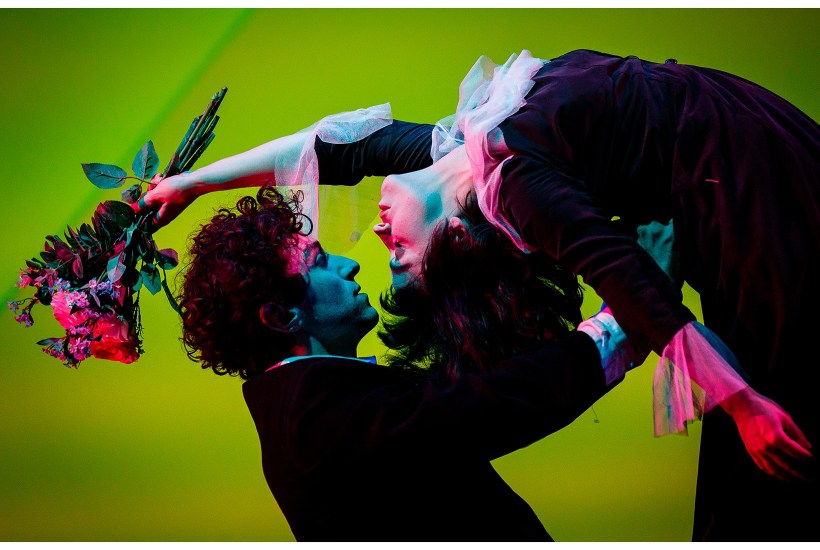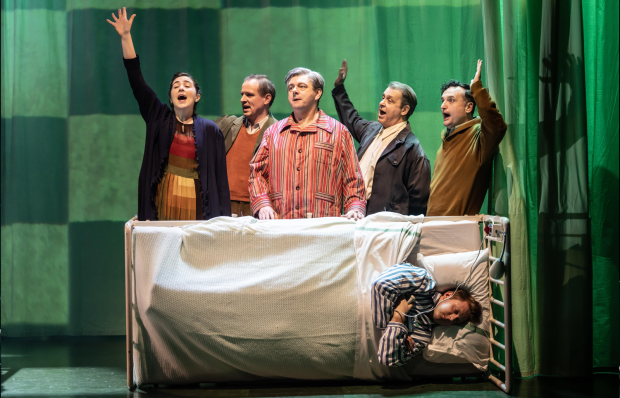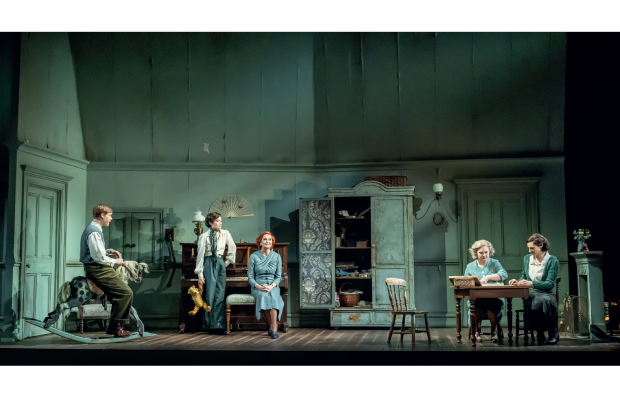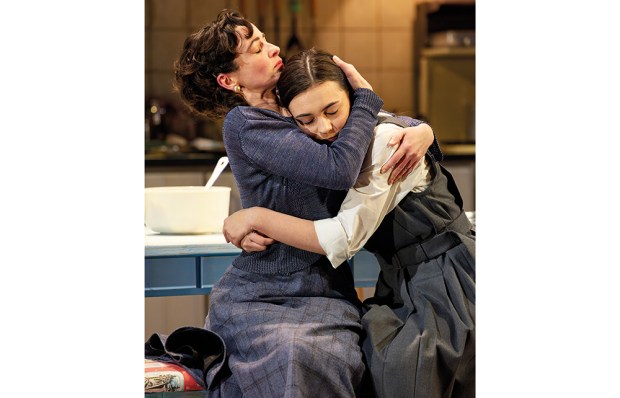The Flying Lovers of Vitebskbegins with a phone conversation between a pretentious art critic and a man called Marc. This turns out to be Marc Chagall, the expressionist painter, who was born in Vitebsk in Belarus in 1887. It would have been helpful to include his name in the title.
Emma Rice, the director, relies on her usual blend of dances, songs and pretty lighting to tell her tale. She has very low expectations of her audience. The sad characters cry. The happy characters laugh. The amorous characters dance rapturously. Everyone sings a lot. The script consists mainly of plot points written in clunky, airless prose. ‘It was the best exhibition I’ve ever had,’ announces Marc after an early success in Berlin. ‘Now I can go back to Russia with my head held high.’ He seduces a model, Bella, but dumps her and moves to Paris in search of fame. ‘Four years he’s been gone,’ she mopes, ‘and he writes hardly at all.’ Then he marches back into town with a marriage proposal. ‘My knowing you has always seeped backwards as well as forwards in time,’ he says, perhaps trying to imitate in words the swirly, mystical texture of his dreamscapes.
Marc comes across as a restless attention seeker who seems well suited to the clingy, simpering Bella. When war breaks out in 1914, he’s saved from the draft by a relative who finds him a desk job in St Petersburg. But he’s not remotely grateful. ‘I hate St Petersburg. It’s so cold,’ he says perceptively. Meanwhile Bella pines away at home listening to the leaky roof while talking to the clock. ‘Each tick is an uphill struggle,’ she says. A fair summary of the show. Later we learn that she’s a gifted writer who studied drama under Stanislavski and read philosophy and literature at university. So why was she stuck in the kitchen listening to a dripping bucket? Flashes of surrealism are incorporated into the action, not always successfully.
When Marc and Bella find a new apartment, they unpack a trunk full of hats shaped like plaster animals (a scarlet rooster, a turquoise salmon), which they strap to their heads while singing a song that goes, ‘lah-dee, di-dee dah’. After the October Revolution, a thug smashes their window with a brick. Attached to it is a letter from the government inviting Marc to become an arts commissar. Perhaps that’s a joke about the communist postal service. He ends up working in Moscow as a scene painter, which also displeases him. ‘Actors are so tiringly colourful, aren’t they?’ Those who know Chagall’s history are likely to find this laborious and slow-moving. The choppy blend of sketches, songs and dance routines becomes harder to bear as the show grinds on. It’s like eating 58 luxury chocolates and pretending it’s a meal.
The Kids Are Alright is a co-production by a group of smallish theatres in London and Newcastle that enjoy Arts Council support. The setting is a housing estate where a married couple, Keith and Karen, are dealing with the death of their child, Sophie. The creators, Lee Mattinson and Jen Malarkey, are good at quirky suburban dialogue. ‘She’s got a lasagne the size of a thatched cottage wants eating and she’s invited over some of the chubbier girls.’ But their theme is grief and they want to play it for laughs. Keith proposes to bury his daughter in the grass outside their flat, but Karen objects: ‘You’ve forgotten the time we watched teenagers in tears vomiting here.’ They discuss celebrating her tenth birthday with a sex session in a candlelit bathtub. Clearly, these are not real parents and their mourning is a hoax of some kind. And the story keeps taking irrational turns. Karen suddenly announces, ‘Sophie’s not dead. She’s in Portugal.’ The couple go on an imaginary journey between the Greek islands, the Algarve and a Mediterranean cruise. Later they move to Texas where a redneck named Travis is searching for a lost character called Cody. To make things more obscure, the role of Travis is taken by both Karen and Keith. And the mystery doesn’t end there. Karen is played by a male in a frock while Keith is played by a black actress in a shell suit.
This weird, frenetic show is too ambitious for its own good. It wants to be a hilarious and moving deconstruction of parental loss but the story is impossible to follow and the threadbare characters have no inner reality. In any case, the death of a child is an exceptionally difficult topic for comedy. (We can pass over the distasteful references to Madeleine McCann.) Why did this embarrassing flop get funded? Perhaps cowardice. It features cross-dressing and transracial casting and the commissioners may have feared accusations of prejudice if they turned it down. A bad day at the office for the Arts Council.
Got something to add? Join the discussion and comment below.
Get 10 issues for just $10
Subscribe to The Spectator Australia today for the next 10 magazine issues, plus full online access, for just $10.
You might disagree with half of it, but you’ll enjoy reading all of it. Try your first month for free, then just $2 a week for the remainder of your first year.














Comments
Don't miss out
Join the conversation with other Spectator Australia readers. Subscribe to leave a comment.
SUBSCRIBEAlready a subscriber? Log in